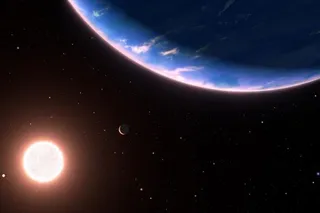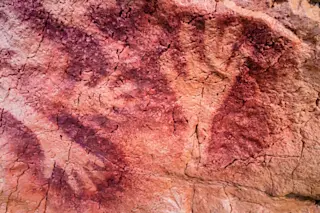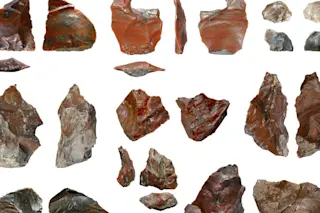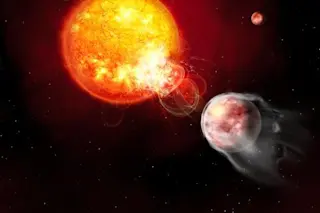Or perhaps you would like to name it "Tatooine" or "Wrigley's Pleasure Planet"? If so, you are in luck--all you need to pay a small fee and keep voting. A startup company called Uwingu is holding a "people's choice contest" to pick a name for the nearest planet outside our solar system. It orbits Alpha Centauri B, an orange star located just 4.3 light years from Earth, and currently has the ungainly name Alpha Centauri Bb. For $4.99 you can propose a name of your own, and for $0.99 you can vote on the winner. The contest runs until April 22; there is also a broader, ongoing campaign for other alien worlds.
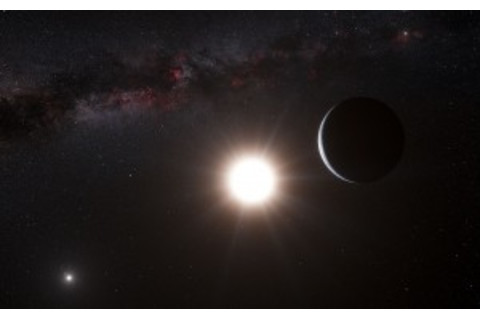
Illustration of the Earth-size planet orbiting Alpha Centauri B, part of the closest star system to home. The planet is currently known only as Alpha Centauri Bb. (Credit: ESO/L. Calçada/Nick Risinger) Uwingu's name-that-planet project has a noble aim. Alan Stern--the founder of the company, lead scientist for the New Horizons mission to Pluto, and a former associate administrator at NASA--is using the money raised by the contest to restore funding to NASA's education and outreach efforts, which have been hit hard by sequester-related budget cuts. [Full disclosure: DISCOVER magazine and its sister publication, Astronomy, have partnered with Uwingu on its efforts to raise private funds for astronomical research.] But as one side effect, Stern has found himself embroiled in a battle with the International Astronomical Union (IAU), the self-described arbiter of "unambiguous astronomical nomenclature." In a testy statement released on April 12, the IAU declared that private competitions (the union never cites Uwingu by name) will "have no bearing on the official naming process." All of which raises a big question for the rest of us: Who gets to name new astronomical objects, and how exactly do they get that right? The IAU was born in 1919, during an era of post-war international collaboration. Operating as kind of United Nations for astronomy, the IAU today includes nearly 11,000 astronomers from 93 countries, giving it broad authority and legitimacy in setting standards for the field. One of the most prominent powers it wields is the authority to issue official names. But that process is complicated and often controversial--as the union itself acknowledges up top. The abbreviated public summary of the IAU's naming procedures runs nearly 4,000 words because of its complexity. Comets, for instance, all have two separate designations: a compound alphanumeric tag that indicates the date of discovery and the type of comet, and a separate name that recognizes the people, instrument, or spacecraft that made the actual discovery. That's how we ended up with two very odd comet names this year. Comet PanSTARRS is named after a telescope array in Hawaii; Comet ISON, which may make a spectacular appearance later this year, is named after a Russian-based astronomical network. If you discover an asteroid, a whole other kind of bureaucracy awaits. First, its orbit must be well established, a process that can take many years. Then it receives a formal number by the IAU, which buys the asteroid's discoverer a 10-year window to select a name. The name can be anything (there are asteroids named Zappafrank and Misterrogers), provided it meets a lengthy list of conditions. For instance, it cannot be longer than 16 characters, and names of pets are "discouraged" (whatever that means). The rules for dwarf planets, Kuiper Belt Objects, new satellites, and specific features (craters, mountains, etc) on other worlds all have their own IAU methodology. It's a bit overwhelming; take a look for yourself. The situation for giving names to planets around other stars is particularly obscure, because for now there is no official procedure whatsoever. Although the first exoplanet (the technical term for a planet outside of our solar system) was discovered in 1995, the IAU didn't even consider the possibility of naming these worlds until fourteen years later. At that point, the IAU general assembly punted, failing to reach any consensus and generally opposing the whole idea of giving names to new planets. Given all the excitement about exoplanets these days--and the hundreds new worlds that have been discovered--the IAU plans to revisit the issue this year. The IAU committee considering the issue is called the "IAU Division F Commission 53 Extrasolar Planets (WGESP)." It has, as yet, delivered no official decision.
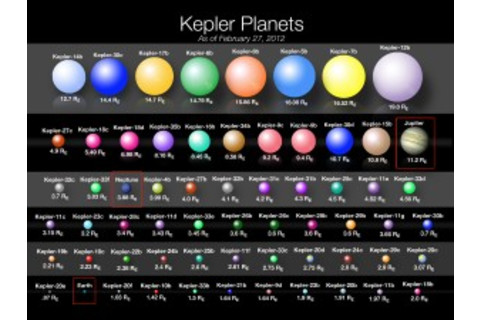
New planets found by NASA's Kepler space observatory: So many worlds, so few names. (Credit: NASA/Kepler Mission/Wendy Stenzel) Nevertheless, when Uwingu recently launched its planet-naming contest, IAU officials were clearly not pleased about being bypassed by a private organization. In a widely circulated statement, the IAU wrote: "Recently, an organization has invited the public to purchase both nomination proposals for exoplanets, and rights to vote for the suggested names. In return, the purchaser receives a certificate commemorating the validity and credibility of the nomination. Such certificates are misleading, as these campaigns have no bearing on the official naming process..." No doubt a large part of the reason for that indignation is that the IAU, and professional astronomers in general, have spent years fighting shady companies that would offer to "sell" star names and place them in an official-looking registry. These schemes clearly were intended to mislead customers into thinking that they were purchasing an official scientific name, and the proceeds of the sale were used for nothing but the enrichment of the sellers. But what Alan Stern is doing here is fundamentally different in several ways. Stern points out that he never said his names would be official--although he says that "of course" he hopes the names that emerge from his campaigns will eventually be the widely used ones. The Uwingu campaign is dedicated to aiding astronomy education, a mission that dovetails with the IAU's own goals. Some of the funds raised so far by Uwingu have gone to support Astronomers Without Borders, the Galileo Teacher Training Program, and the Allen Telescope Array, which searches for signals from extraterrestrial civilizations. "All of it is with the purpose of fueling The Uwingu Fund for space research and space education grants," Stern says. Uwingu's team works without pay. And this kind of voting contest bears far more resemblance to a crowdsourcing campaign than it does to the single-sale model of the old star-registry hustlers. New Worlds, New Challenges To Stern, his dust-up with the IAU partly comes down to a philosophical battle between a bottom-up and top-down approach to astronomy. The IAU's position is that only a professional organization should bestow names on new planets. Stern responds that "a model more like the Internet domain registry, with many providers, would be better than a monopoly. There's no confusion when that's done properly, as the Internet shows." He's also a big fan in public participation, which is essentially the opposite of the professional model on which the IAU was founded. On April 15, three days after the IAU statement, Uwingu responded with a press release of its own. In it, Uwingu notes that many astronomical objects have multiple names. (One example: In different contexts and different catalogues, the star Polaris is known as the North Star, Alpha Ursae Minoris, HD 8890, HIP 11767, SAO 308, ADS 1477, FK5 907, etc.) At the same time, many colloquial names (again, North Star is one such example) long predate the IAU, while others emerge directly from scientists' nicknames and informal terminology. Press notices from the Hubble Space Telescope and the European Southern Observatory are rife with such coinages--the "Pillars of Creation" is one of the most famous. Researchers working with NASA's Curiosity rover give informal but widely recognized names to new Mars features all the time. Uwingu says that the IAU is both overreaching and mischaracterizing Uwingu's contest. From the Uwingu release: "Uwingu affirms the IAU’s right to create naming systems for astronomers. But we know that the IAU has no purview--informal or official--to control popular naming of bodies in the sky or features on them, just as geographers have no purview to control people’s naming of features along hiking trails." For both Uwingu and the International Astronomical Union, the deeper issue here is that the discovery of planets around other stars presents a truly novel naming challenge. Unlike galaxies or stars, these are tangible worlds--places that people want to see, to study, to search for signs of habitability or even signs of life. They feel personal in a way that other astronomical objects do not. And there are a lot of them. From the invention of the telescope to 1995, astronomers had uncovered only three new planets (and one the three, Pluto, has been partially revoked). Since then, they have found roughly 700 confirmed worlds, and thousands more likely planetary candidates. NASA's Kepler mission has just revealed three more, potentially life-friendly worlds, including the most Earth-like planet yet. Giving all of that new cosmic real estate nothing but zip codes seems cold, and also wasteful. This is an extraordinary opportunity to tap into the romance of cosmic exploration and to get the public excited about science. After 18 years, the IAU is still pondering the concept. Uwingu is taking action right now--and the IAU can always consider those contest-winning names later as candidates for the "official" naming process. In the end, it is hard to find fault with Stern's motivating philosophy: "It's a big universe, and one that all people can enjoy connecting to through naming." Follow me on Twitter: @coreyspowell



